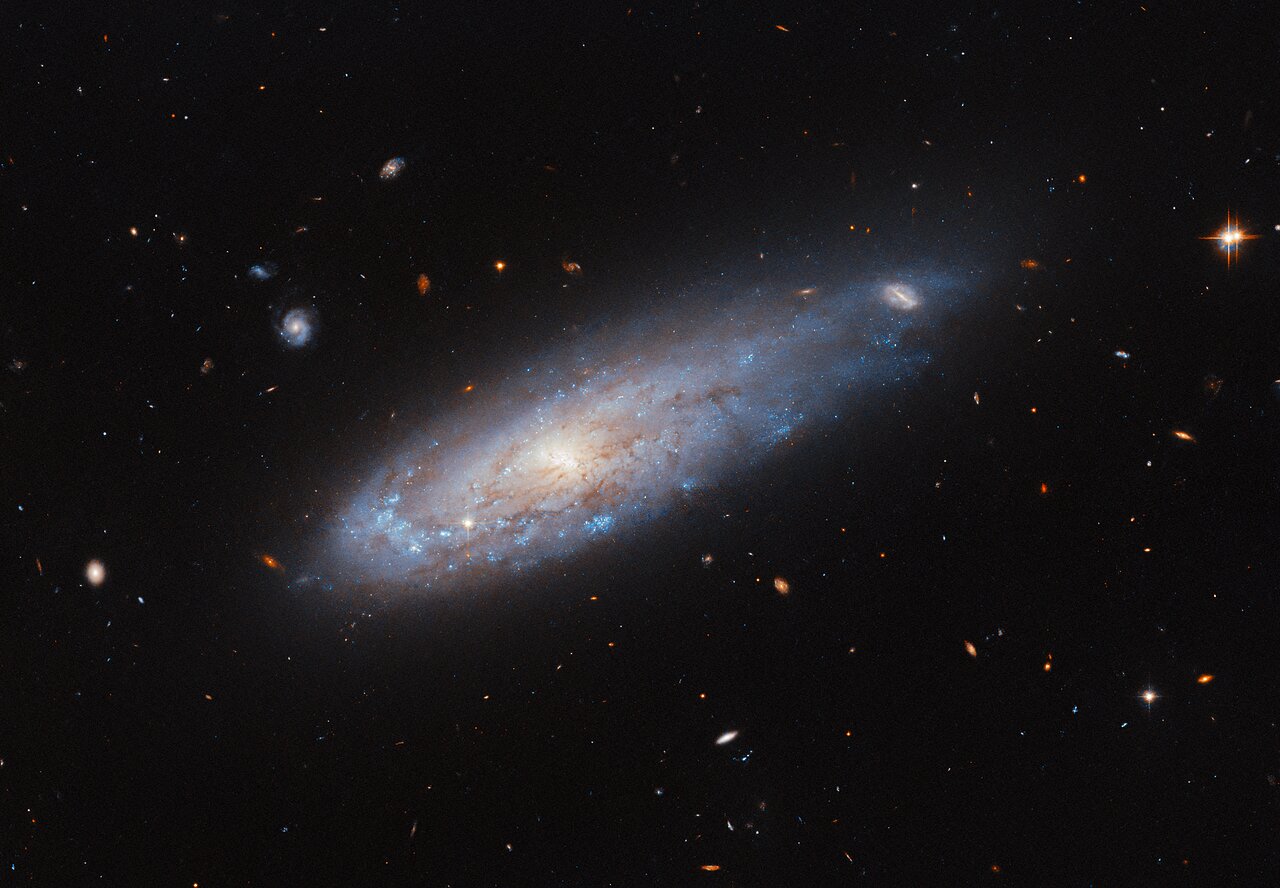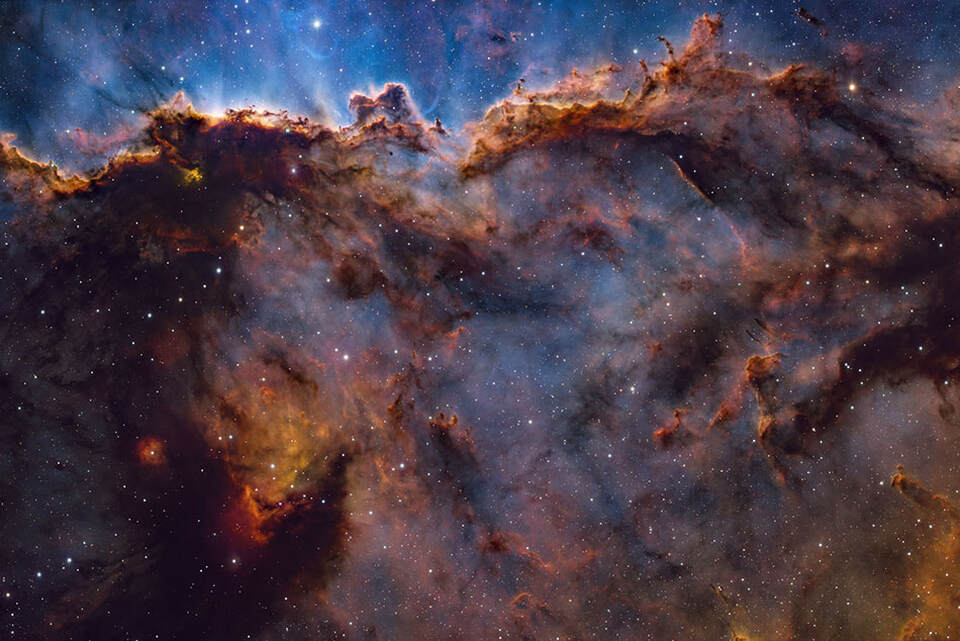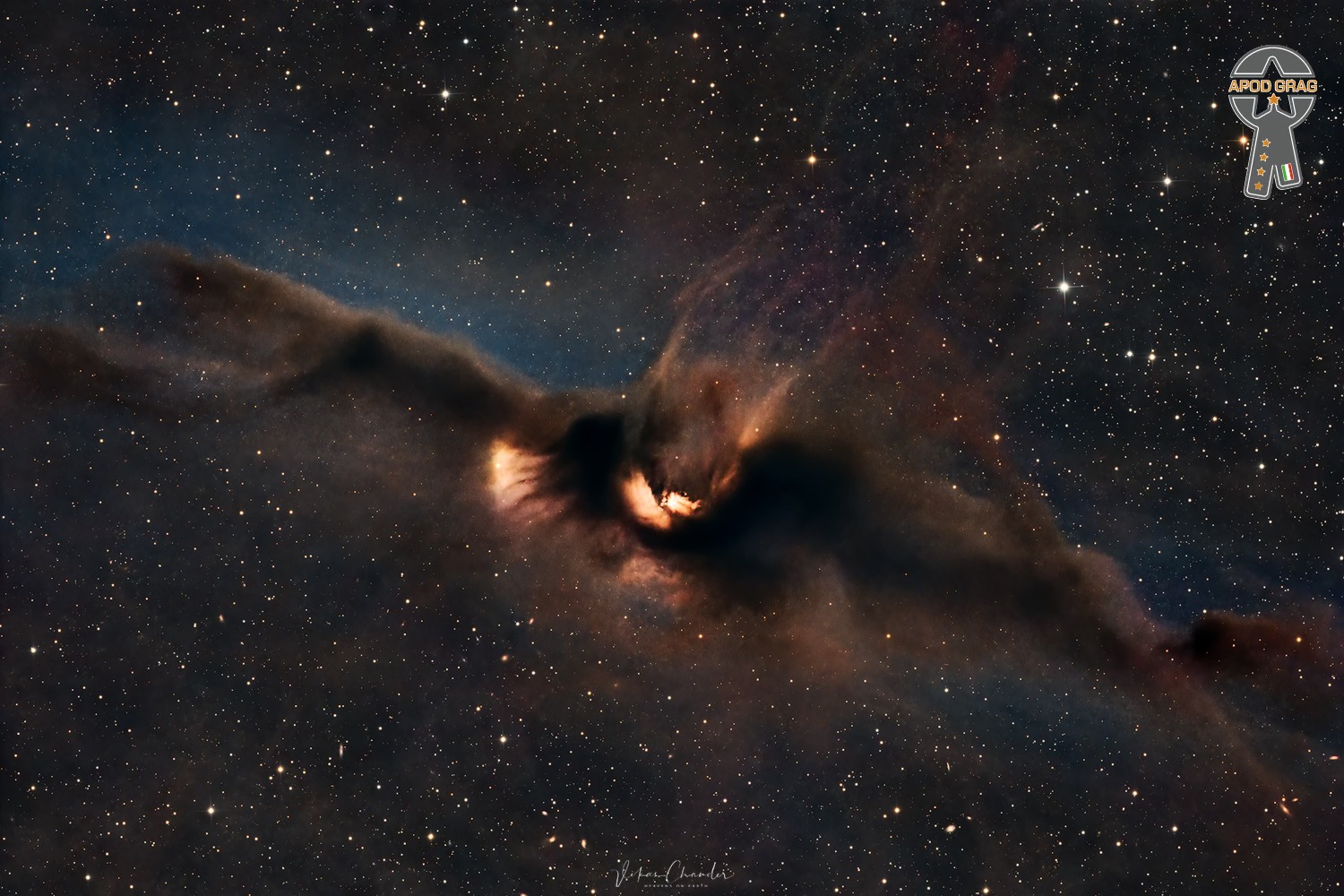Blog
Franz Liszt (22 October 1811 – 31 July 1886) was a Hungarian composer, virtuoso pianist, conductor and teacher of the Romantic period. With a diverse body of work spanning more than six decades, he is considered to be one of the most prolific and influential composers of his era, and his piano works continue to be widely performed and recorded.
more...Cándido Camero Guerra (22 April 1921 – 7 November 2020), known simply as Cándido, was a Cuban conga and bongo player. He is considered a pioneer of Afro-Cuban jazz and an innovator in conga drumming. He was responsible for the embracing of the tuneable conga drum, the first to play multiple congas developing the techniques that all players use today, as well as the combination of congas, bongos, and other instruments such as the foot-operated cowbell, an attached guiro, all played by just one person. Thus he is the creator of the multiple percussion set-up.
more...
The spiral galaxy appearing in this week’s Hubble Picture of the Week is named IC 3225. It looks remarkably as if it’s been launched from a cannon, speeding through space like a comet with a tail of gas streaming from its disc behind it. The scenes that galaxies appear in from Earth’s point of view are fascinating; many seem to hang calmly in the emptiness of space as if hung from a string, while others star in much more dynamic situations! Appearances can be deceiving with objects so far from Earth — IC 3225 itself is about 100 million light-years away — but the galaxy’s location suggests some causes for this active scene, because IC 3225 is one of over 1300 members of the Virgo galaxy cluster. The density of galaxies in the Virgo cluster creates a rich field of hot gas between them, the so-called ‘intracluster medium’, while the cluster’s extreme mass has its galaxies careening around its centre in some very fast orbits. Ramming through the thick intracluster medium, especially close to the cluster’s centre, places an enormous ‘ram pressure’ on the moving galaxies that strips gas out of them as they go. IC 3225 is not so close to the cluster core right now, but astronomers have deduced that it has undergone this ram pressure stripping in the past. The galaxy looks as though it’s been impacted by this: it is compressed on one side and there has been noticeably more star formation on this leading edge, while the opposite end is stretched out of shape. Being in such a crowded field, a close call with another galaxy could also have tugged on IC 3225 and created this shape. The sight of this distorted galaxy is a reminder of the incredible forces at work on astronomical scales, which can move and reshape even entire galaxies! [Image Description: A spiral galaxy. Its disc glows visibly from the centre, and has faint dust threaded through it. A spiral arm curves around the left edge of the disc and is noticeably more dense with bright blue spots
more...
Manfred Sepse Lubowitz (born 21 October 1940), known professionally as Manfred Mann, is a South African-born musician, residing in the UK since 1961. He is best known as a founding member of the bands Manfred Mann, Manfred Mann Chapter Three and Manfred Mann’s Earth Band.
more...John Birks “Dizzy” Gillespie(October 21, 1917 – January 6, 1993) was an American jazz trumpeter, bandleader, composer, educator and singer. He was a trumpet virtuoso and improviser, building on the virtuosic style of Roy Eldridge but adding layers of harmonic and rhythmic complexity previously unheard in jazz. His combination of musicianship, showmanship, and wit made him a leading popularizer of the new music called bebop. His beret and horn-rimmed spectacles, scat singing, bent horn, pouched cheeks, and light-hearted personality have made him an enduring icon.
more...
NGC 6188, also known as the Firebird Nebula & Fighting Dragons of Art, is an emission nebula located about 4,000 light yearsaway in the constellation Ara. The bright open cluster NGC 6193, visible to the naked eye, is responsible for a region of reflection nebulosity within NGC 6188. 4000ly.

Martin Taylor, MBE (born 20 October 1956) is a British jazz guitarist who has performed solo, in groups, guitar ensembles, and as an accompanist.
Taylor was born in Harlow, Essex, into a family with a musical heritage and a Gypsy tradition. At the age of four, he received his first guitar from his father, jazz bassist William ‘Buck’ Taylor who only took up music at 30. Buck frequently played the music of the Quintette du Hot Club de France, so the young Martin Taylor became inspired by guitarist Django Reinhardt. At age eight, he was already playing in his father’s band and at 15 he quit school to become a professional musician.
The band Martin joined at 15 called the Oo-yah Band was led by Lennie Hastings, a jazz drummer who had been in the Alex Welsh band. The band included Nick Stevenson (trumpet), Peter Skivington (bass guitar), Ron Brown (trombone), Jamie Evans (piano), Malcolm Everson (clarinet and baritone saxophone).
Over the next few years Taylor played in bands at holiday camps, on radio, and on cruise ships. One cruise gig led to his playing with the Count Basie orchestra. Performing dates in and around London brought him into contact with jazz guitarist Ike Isaacs, who became a mentor. Isaacs not only performed with Taylor as a duet, but also helped Taylor develop his sense of jazz harmony and fingerstyle technique. He recorded for the first time in 1978, with bassist Peter Ind.
more...Eddie Harris (October 20, 1934 – November 5, 1996) was an American jazz musician, best known for playing tenor saxophone and for introducing the electrically amplified saxophone. He was also fluent on the electric piano and organ. His best-known compositions are “Freedom Jazz Dance”, popularized by Miles Davis in 1966, and “Listen Here”.
Harris was born and grew up in Chicago. His father was from Cuba and his mother from Mississippi. He studied music under Walter Dyett at DuSable High School, as had many other successful Chicago musicians (including Nat King Cole, Clifford Jordan, Johnny Griffin, Gene Ammons, Julian Priester, and others). He later studied music at Roosevelt University; by that time he was proficient on piano, vibraphone, and tenor saxophone. While in college he performed professionally with Gene Ammons.
After college, Harris was drafted into the United States Army and while serving in Europe, he was accepted into the 7th Army Band which also included Don Ellis, Leo Wright, and Cedar Walton.
more...Ferdinand Joseph LaMothe (Lemott, later Morton; c. September 20, 1890 – July 10, 1941), known professionally as Jelly Roll Morton, was an American ragtime and jazz pianist, bandleader, and composer of Louisiana Creole descent. Morton was jazz’s first arranger, proving that a genre rooted in improvisation could retain its essential characteristics when notated. His composition “Jelly Roll Blues“, published in 1915, was one of the first published jazz compositions. He also claimed to have invented the genre.
Morton also wrote “King Porter Stomp“, “Wolverine Blues“, “Black Bottom Stomp“, and “I Thought I Heard Buddy Bolden Say”, the last being a tribute to New Orleans musicians from the turn of the 20th century.
Morton’s claim to have invented jazz in 1902 was criticized. Music critic Scott Yanow wrote, “Jelly Roll Morton did himself a lot of harm posthumously by exaggerating his worth … Morton’s accomplishments as an early innovator are so vast that he did not really need to stretch the truth.” Gunther Schuller says of Morton’s “hyperbolic assertions” that there is “no proof to the contrary” and that Morton’s “considerable accomplishments in themselves provide reasonable substantiation.
more...Charles Edward Ives (October 20, 1874 – May 19, 1954 Danbury, CT) was an American modernist composer, actuary and businessman. Ives was among the earliest renowned American composers to achieve recognition on a global scale. His music was largely ignored during his early career, and many of his works went unperformed for many years. Later in life, the quality of his music was publicly recognized through the efforts of contemporaries like Henry Cowell and Lou Harrison, and he came to be regarded as an “American original”. He was also among the first composers to engage in a systematic program of experimental music, with musical techniques including polytonality, polyrhythm, tone clusters, aleatory elements, and quarter tones. His experimentation foreshadowed many musical innovations that were later more widely adopted during the 20th century. Hence, he is often regarded as the leading American composer of art music of the 20th century.
Sources of Ives’s tonal imagery included hymn tunes and traditional songs; he also incorporated melodies of the town band at holiday parade, the fiddlers at Saturday night dances, patriotic songs, sentimental parlor ballads, and the melodies of Stephen Foster.
more...

Winston Hubert McIntosh OM GCOT (19 October 1944 – 11 September 1987), professionally known as Peter Tosh, was a Jamaican reggae musician. Along with Bob Marley and Bunny Wailer, he was one of the core members of the band the Wailers (1963–1976), after which he established himself as a successful solo artist and a promoter of Rastafari. He was murdered in 1987 during a home invasion.
Tosh was born Winston Hubert McIntosh in Westmoreland, the westernmost parish of Jamaica. He was abandoned by his parents and “shuffled among relatives”. When McIntosh was fifteen, his aunt died and he moved to Trenchtown in Kingston, Jamaica. He was educated in Bluefields up to age 17, then moved to Kingston to live with his aunt. He began an apprenticeship as a welder.
He first learned guitar after watching a man in the country play a song that captivated him. He watched the man play the same song for half a day, memorizing everything his fingers were doing. He then picked up the guitar and played the song back to the man. The man then asked McIntosh who had taught him to play; McIntosh told him that he had. During the early 1960s, as an aspiring musician, Tosh went to vocal teacher Joe Higgs, who gave free music lessons to young people. Through his contact with Higgs, Tosh met Robert Nesta Marley (Bob Marley) and Neville O’Reilly Livingston (Bunny Wailer). He then changed his name to Peter Tosh and the trio started singing together in 1962. Higgs taught the trio to harmonise and while developing their music, they would often play on the street corners of Trenchtown.
Tosh said he did not have any money in the house, after which Lobban and the fellow gunmen began opening fire in a reckless manner. Tosh was shot twice in the head and killed. Herbalist Wilton “Doc” Brown and disc jockey Jeff ‘Free I’ Dixon also died as a result of wounds sustained during the robbery. Several others in the house were wounded, including Tosh’s common law wife Andrea Marlene Brown, Free I’s wife Yvonne (“Joy”); Tosh’s drummer Carlton “Santa” Davis, and musician Michael Robinson.
more...Farid al-Atrash (Arabic: فريد الأطرش; October 19, 1917 – December 26, 1974), also spelled Farid El-Atrache, was a Syrian-Egyptian singer, oudist, composer, and actor. Although born in Syria, he immigrated to Egypt at the age of nine with his mother and siblings, where he eventually became one of the most noted figures in 20th-century Arabic music.
Al-Atrash embarked on a highly successful career spanning more than four decades, recording 500 songs and starring in 31 movies. He is also widely regarded for his virtuosity on the Arabic oud, and has sometimes been given the epithet “King of the Oud” (“Malek al-Oud”).
more...More Posts
- Idir Memorial
- Richie Cole Memorial
- The Cosmos with CW Tauri: [B77] 71 (Bernes)
- Sonny Payne Day
- Ron Carter Day
- Don Friedman Day
- Maynard Ferguson Day
- Umm Kulthum Day
- World Music with Marla Leigh
- Daily Roots with Jah Bless
- Music for Surviving the Pandemic
- WEAR YOUR FACE MASK
- MAYDAY Parade, Ceremony & Festival CANCELLED 2020
- The Cosmos with M1
- James Brown Day
- Jimmy Cleveland Day
- Pete Seeger Day
- John Lewis Day
- World Music with Fanfare Ciocărlia
- Daily Roots with Lucky Dube